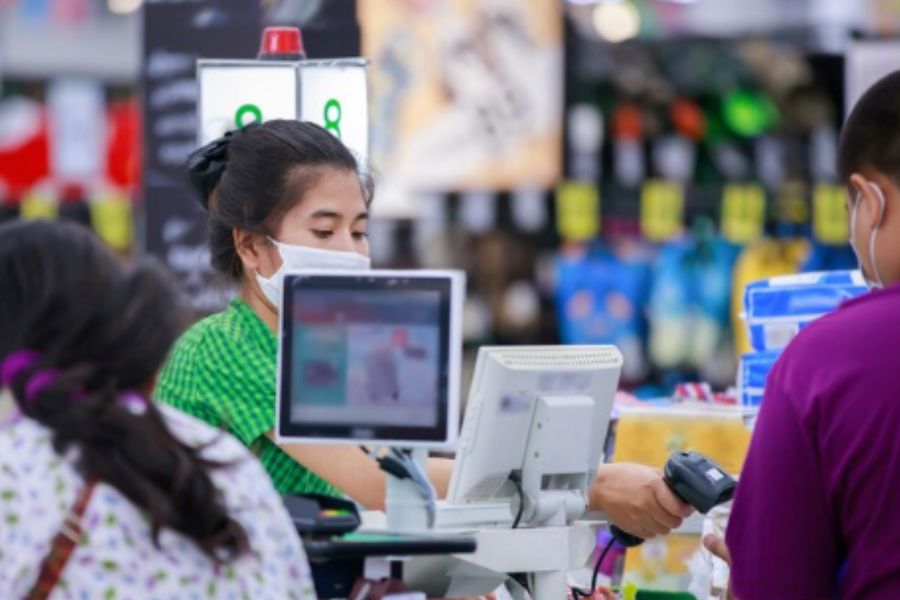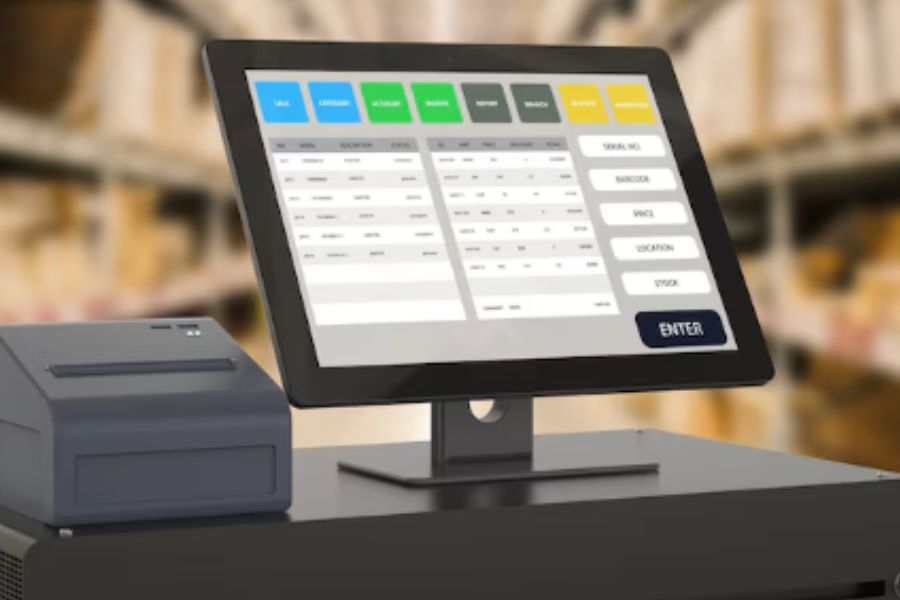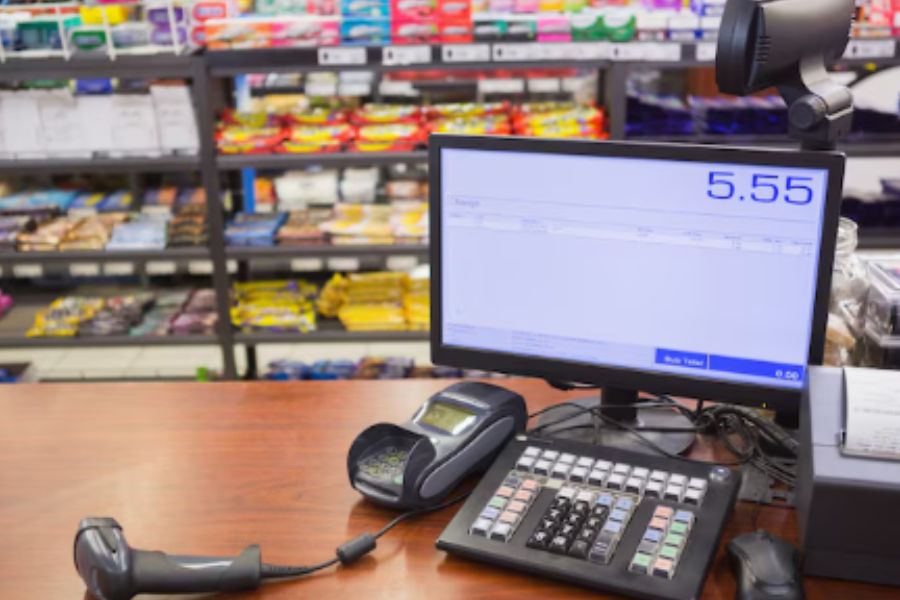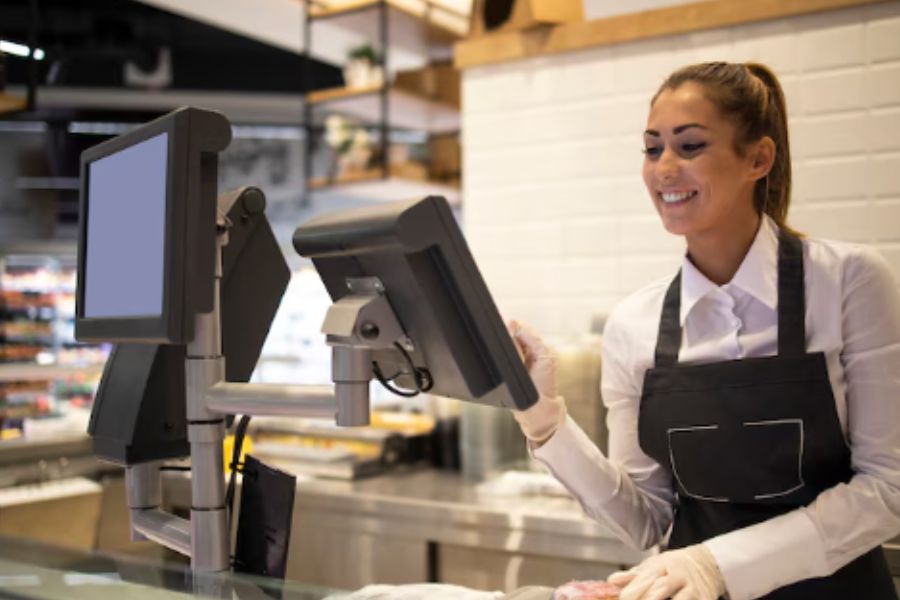Managing a grocery store in Indonesia isn’t as easy as it looks. Competition from traditional markets, changing consumer tastes, and logistical headaches are just the beginning. To manage these issues, many store owners turn to technology, especially a good grocery store POS system Indonesia. But what exactly makes a POS system the right fit here?
Let’s first get a quick look at the grocery scene in Indonesia.
Highlights:
- The grocery market in Indonesia is shaped by high-volume transactions, a mix of modern and traditional retail formats, and strong demand for local payment methods like QRIS, OVO, and GoPay.
- A grocery POS system in Indonesia must support real-time inventory tracking, local digital payments, multi-store management, tax-compliant invoicing, and offline operation.
Overview of The Indonesian Grocery Retail Landscape
Indonesia is a massive place, home to over 270 million people spread across thousands of islands. The grocery retail scene reflects this diversity. In big cities like Jakarta or Surabaya, modern supermarkets are everywhere. These stores focus on convenience, cleanliness, and fast service. Customers here are often busy families looking for quick shopping trips and easy payments.
Outside the cities, smaller ‘toko kelontong‘ or mom-and-pop shops dominate. These stores have loyal customers who rely on personal service and flexible payment options. They might not carry as many products, but they’re trusted because the owners know their customers personally.
And then, of course, there are traditional markets called ‘pasar tradisional’. These markets are bustling with fresh produce, meats, and everyday essentials. They offer unbeatable prices and freshness, drawing crowds who shop daily.
So, grocery businesses must juggle modern convenience, personalized service, and affordability. A grocery store POS system Indonesia has to adapt to these different needs, be it for large supermarkets or tiny corner shops.
Unique Challenges Faced by Indonesian Grocery Stores
Grocery stores in Indonesia don’t just compete against each other. They’re up against strong traditional markets, varied customer tastes, and tricky logistics.
Competition with Traditional Markets
Traditional markets have a solid grip on local shopping habits. People trust their vendors for quality fresh foods at lower prices. Supermarkets and grocery chains find it tough to match that level of freshness and personal touch.
When your customers prefer daily trips to the market to get their vegetables, how can you compete? A good grocery store POS system in Indonesia helps manage prices and promotions easily, letting grocery stores offer competitive deals to attract these shoppers.
Diverse Consumer Preferences
Indonesia’s consumers have different tastes depending on their location. Urban shoppers want quick checkout, online ordering, and digital payments. Rural shoppers, meanwhile, might prefer paying in cash and buying smaller quantities.
Keeping everyone happy means having flexible systems in place. A grocery & supermarket POS designed for Indonesia should handle both digital wallets like GoPay and traditional cash transactions. It should also make it easy to manage small-batch inventory in smaller stores.
Logistical Complexities
Indonesia is spread across thousands of islands, and this geography complicates logistics. Deliveries can get delayed or disrupted, making inventory management a nightmare for grocery stores. Mismanaged inventory means lost sales and frustrated customers.
That’s where a good grocery store POS system becomes critical. Real-time inventory management can alert stores when stocks are running low. Managers can order products ahead of time and keep shelves stocked, even when shipments aren’t reliable.
Addressing these unique challenges isn’t simple. But having the right tools, like a solid grocery store POS system Indonesia, makes running your store much less stressful and way more profitable.
Next, we’ll explore exactly which POS features can help Indonesian grocery stores tackle these everyday problems and grow sustainably.
Essential Features of a Grocery Store POS System in Indonesia
Running a grocery business here demands more than basic tools. A suitable grocery store POS system Indonesia should have features designed specifically to address local needs.
Let’s check out some key features your POS can’t go without.
1. Real-Time Inventory Management
When it comes to groceries, freshness matters. A good POS system helps you track stock in real time. You’ll know exactly when fresh goods arrive, when they’re sold, and when they’re close to expiration. No more guesswork means fewer wasted products and happier customers.
Real-time inventory updates also let you spot trends early. If certain items move fast, you can restock quicker. If products aren’t selling, you can clear them out before they spoil.
2. Multi-Location Management
If you run more than one store, keeping track can get messy. A smart POS solves this by managing all locations from a single platform. You get instant updates on stock, sales, and promotions across every store.
Want to adjust pricing in a store in Bandung while running a promotion in Jakarta? You can do both easily without confusion or extra effort. This feature makes expanding your business easier and less stressful.
3. Integration with Local Payment Methods
In Indonesia, shoppers use many payment methods: cash, bank transfers, digital wallets like GoPay, OVO, or QRIS. A POS system that accepts local payments smoothly is essential.
When customers can pay the way they prefer, checkout becomes quick and stress-free. This small convenience can turn casual shoppers into regular customers.
4. Support for Various Promotion Schemes
Indonesians love promotions. Special offers, bundles, discounts, and flash sales draw crowds. A good grocery store POS system Indonesia should handle different promotion types effortlessly.
Whether you run buy-one-get-one-free offers, weekend discounts, or special prices for loyalty members, your POS should make it easy to set up, track, and analyze these campaigns.
5. Offline Mode Functionality
Internet in Indonesia isn’t always reliable, especially outside major cities. You need a POS system that works even when you’re offline. With offline mode, transactions continue smoothly, and data syncs up automatically once you’re back online.
This feature means no lost sales, even during power outages or network interruptions. Shoppers don’t have to wait or leave frustrated, keeping your reputation intact.
6. Integration with Weighing Scales
Selling groceries means weighing products regularly. Traditional manual weighing can slow down checkout, leading to long queues.
An integrated weighing scale feature connects your digital scales directly to your POS. Customers get quick, accurate pricing based on weight, saving time and avoiding mistakes.
7. Customer Relationship Management (CRM)
Personal relationships matter in grocery retail, especially in Indonesia. Shoppers appreciate stores that know their buying habits and offer personalized deals.
A built-in CRM POS in your POS helps you track customer purchases, preferences, and shopping frequency. Using this information, you can send targeted promotions, loyalty rewards, or birthday discounts to keep customers coming back.
8. Compliance with Local Regulations
Finally, any grocery store POS system Indonesia must follow local laws. Tax-compliant receipts, clear e-invoices, and reporting tools are mandatory.
Your POS should generate tax-compliant invoices automatically. Having Bahasa Indonesia support makes sure every customer understands receipts clearly, which boosts trust and professionalism.
These essential features aren’t just ‘nice-to-haves.’ They directly help Indonesian grocery businesses stay competitive, organized, and profitable. Choosing a POS system with these built-in tools sets your grocery store up for sustainable growth.
Next, let’s discover why ConnectPOS is becoming a favorite choice among grocery store owners across Indonesia.
Meet ConnectPOS: The Go-To POS for Indonesian Grocery Retailers
Opening a grocery store in Indonesia, with its fragmented markets, diverse shoppers, and cash-heavy culture, makes things quite complex. That’s where ConnectPOS steps in.
ConnectPOS is a cloud-based POS system built for modern retail. It’s trusted by over 12,000 businesses around the globe. For grocery and supermarket owners juggling both online and offline sales, ConnectPOS brings speed, control, and flexibility to the table.
Here’s why it stands out:
- Real-time inventory tracking across all locations and sales channels: Instantly see what’s in stock, what’s running low, and what’s selling fast. You’ll catch inventory trends early and make better purchasing decisions.
- Multi-store management from a single dashboard: Manage prices, inventory, and promotions across multiple stores easily. Forget switching between tools; control everything from one simple dashboard.
- Offline mode to keep sales running even without internet: Unreliable internet? No worries. ConnectPOS keeps transactions going without interruption. Your data automatically syncs once you’re back online, ensuring no sales are lost.
- Smooth checkout experience built for speed: Help customers check out quickly using self-service kiosks or mobile POS. Fast barcode and QR code scanning means shorter lines and happier shoppers.
- Weighing scale integration built for grocery operations: Sell fresh goods accurately by linking your digital scales directly to your POS. Weigh, scan, and price items instantly, cutting down checkout time.
- Flexible integration with top retail platforms and tools: ConnectPOS integrates smoothly with popular platforms like Shopify, Magento, and BigCommerce. It also connects with accounting, CRM, and ERP systems, plus local payment methods, and scales widely used in Indonesia.
- Smart promotions engine for loyalty rewards, combo deals, and more: Launch special offers, bundled discounts, or loyalty rewards quickly. ConnectPOS lets you easily create personalized promotions based on customers’ shopping history.
- Built-in CRM tools that build loyalty: Understand your customers better. Track purchase histories and buying habits to send targeted offers. Personalize loyalty programs to encourage repeat visits.
- POS analytics and sales reports accessible anytime, anywhere: Get clear insights into your sales data anytime you need it. Identify top-selling products, busiest hours, and customer preferences with report & analytics features directly from your phone or laptop.
- Support for local payment methods, including QRIS, GoPay, and cash: Keep checkout convenient by accepting the payment methods your customers prefer. Whether it’s cash, QR codes, or e-wallets, ConnectPOS makes payments smooth.
- Custom screen layout, barcode scanning, and on-the-spot receipt printing: Adjust your POS screens to match your everyday workflow. Quickly scan barcodes and print receipts instantly, improving checkout speed and customer satisfaction.
- Regulatory-ready with e-invoicing and Bahasa Indonesia support: Easily create e-invoices and receipts that meet local tax standards. Clear, professional Bahasa Indonesia receipts make it simple for shoppers and compliance authorities.
- O2O features that connect online and offline shopping: Let customers buy online and pick up in-store or arrange delivery seamlessly. Easily manage exchanges, refunds, and discounts across all channels without confusion.
With fewer headaches over daily operations, you’ll have more time to focus on keeping shelves stocked and customers smiling.
FAQs: Grocery Store POS Systems in Indonesia
1. How do POS systems assist with inventory management in multi-location grocery stores?
POS systems track sales and update inventory across all locations automatically. This helps grocery stores maintain accurate stock levels and avoid running out or overstocking items.
2. Are POS systems in Indonesia compatible with local payment methods like QRIS?
Yes, most modern POS systems in Indonesia fully support local payment methods like QRIS, GoPay, OVO, and others, ensuring smooth transactions.
3. What costs are involved in implementing a POS system for grocery stores?
The costs vary depending on store size and specific needs. Common expenses include software licensing, hardware (POS terminals, scanners), system integration, employee training, and ongoing maintenance.
4. Can POS systems operate during internet outages?
Yes, many POS systems have offline capabilities, allowing you to continue sales even without internet access. The system automatically syncs all data once the connection is restored.
5. How do POS systems enhance the customer experience in Indonesian grocery stores?
POS systems simplify checkout, support various local payments, and manage loyalty programs. Together, these features improve the shopping experience by saving customers time and effort.
6. How do POS systems support compliance with Indonesian tax regulations?
POS systems automate tax calculations and generate compliant e-invoices and receipts. They also keep accurate records to simplify audits and ensure your store meets local tax requirements.
Final Thoughts
Grocery retailers in Indonesia face challenges like managing perishable stock, handling high transaction volumes, and keeping up with local payment preferences. Yet, using the right technology makes all the difference. Choosing a grocery store POS system in Indonesia that fits local needs and tackles specific market issues can dramatically improve your operations.
ConnectPOS combines powerful features, ease of use, and local compatibility, making it an ideal choice for Indonesian grocery retailers looking to thrive. Ready to simplify your grocery business? Get in touch with our team today.



